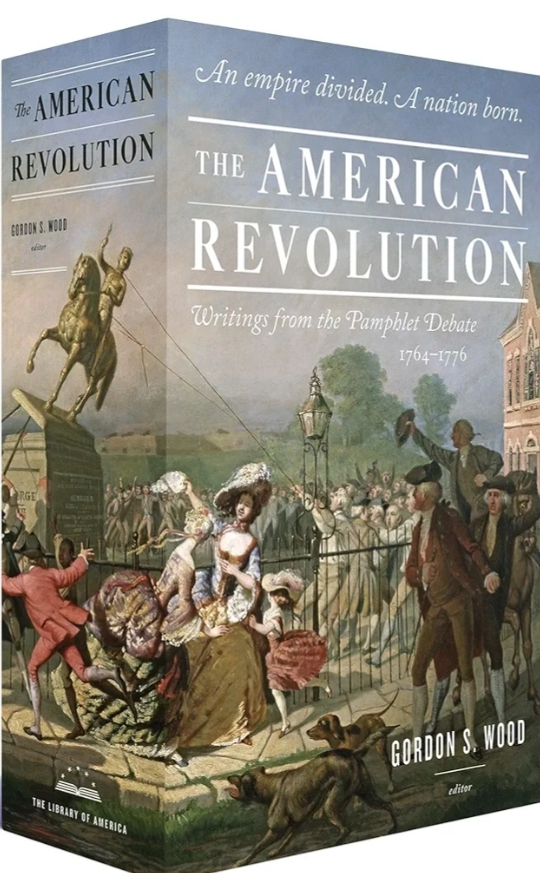Gordon S. Wood’s The American Revolution: Writings from the Pamphlet Debate 1764-1776 is a two-volume boxed set that compiles some of the most significant pamphlets from the years leading up to the American Revolution. Edited by the esteemed historian Wood, this collection provides an in-depth look at the political debates, arguments, and ideas that shaped the revolutionary movement in America. These pamphlets were critical in influencing public opinion and articulating the colonists’ grievances and aspirations during a time of growing tension with Great Britain.
Key Themes and Concepts:
The Importance of Pamphlets in the Revolution: Pamphlets were one of the primary forms of communication during the revolutionary era, offering a platform for intellectual and political discourse. They allowed the colonists to argue their case for independence and to challenge British policies, reaching a wide audience across the colonies. These writings were essential in shaping public opinion and mobilizing support for the revolutionary cause.
Colonial Grievances Against British Policies: Many of the pamphlets focus on the colonists’ objections to British policies, including taxation without representation, restrictions on trade, and the quartering of British troops. These arguments laid the groundwork for the eventual break from Britain, highlighting the colonists’ belief in their rights as Englishmen and their opposition to what they saw as an overreaching and tyrannical government.
Liberty, Rights, and Republicanism: The pamphleteers often drew on Enlightenment ideas about natural rights, liberty, and self-government. They argued that all people have certain inherent rights that cannot be infringed upon by a government, and that the British crown had violated these rights through its policies in the colonies. Many pamphlets advocated for a form of republican government, one based on the consent of the governed rather than hereditary monarchy.
Influence of Classical and Enlightenment Thought: The writings in this collection are deeply influenced by the intellectual currents of the time, including the works of John Locke, Montesquieu, and classical republican thinkers. The pamphleteers used these ideas to argue for political reform, limited government, and the protection of individual liberties, framing their struggle as part of a broader global movement for human rights and freedom.
The Evolving Argument for Independence: While early pamphlets often called for reconciliation with Britain, the tone of the debate shifted over time. As tensions escalated, many writers began to argue for full independence from Britain. The collection shows this evolution in thought, from initial calls for redress of grievances to a more radical demand for complete political and economic separation.
Federalism and the Role of Government: In addition to independence, many pamphlets discuss the nature of government itself. The writers debated questions about the ideal form of government, the balance between liberty and authority, and the role of the colonies within the broader British Empire. These debates would later influence the drafting of the Articles of Confederation and the U.S. Constitution.
Structure of the Set:
Volume 1: 1764-1772 covers the early years of the pamphlet debate, focusing on the initial colonial protests against British taxation policies, such as the Stamp Act and the Townshend Acts. It includes key writings from figures like John Dickinson, James Otis, and Benjamin Franklin, who argued for the rights of the colonies within the British Empire.
Volume 2: 1773-1776 captures the escalating conflict between the colonies and Britain, with pamphlets that reflect the shift toward independence. This volume includes writings from influential revolutionaries like Thomas Paine, Samuel Adams, and Patrick Henry, whose pamphlets played a critical role in building support for the break from Britain and the creation of a new, independent nation.
Notable Pamphlets and Writers:
John Dickinson’s Letters from a Farmer in Pennsylvania (1767-1768): In this series of letters, Dickinson argues against the Townshend Acts, emphasizing the illegality of taxation without representation and the importance of constitutional rights.
James Otis’ The Rights of the British Colonies Asserted and Proved (1764): Otis outlines the legal and moral arguments against British taxation policies, asserting that the colonies should not be taxed by Parliament without their consent.
Thomas Paine’s Common Sense (1776): One of the most influential pamphlets in American history, Paine’s work made the case for immediate independence from Britain, arguing that monarchy was an illegitimate form of government and that the colonies had the right to self-rule.
Samuel Adams’ The Rights of the Colonists (1772): Adams articulates the natural rights of the colonists, laying out the principles of liberty and justice that would later inform the Declaration of Independence.
Richard Bland’s An Inquiry into the Rights of the British Colonies (1766): Bland defends the colonies’ right to self-governance and challenges the legal basis for British authority over the colonies.
Significance:
This boxed set is an invaluable resource for anyone interested in the intellectual history of the American Revolution. The pamphlets included in this collection provide a window into the minds of the revolutionaries and show how the debates over rights, government, and independence were framed. By presenting these primary documents in their entirety, Gordon S. Wood gives readers access to the writings that shaped the American Revolution and the founding of the United States.
Conclusion:
The American Revolution: Writings from the Pamphlet Debate 1764-1776 is an essential collection for understanding the political and ideological foundations of the American Revolution. Edited by one of the foremost historians of the period, this set offers readers a comprehensive look at the debates that shaped the revolution and the creation of the United States. Through the pamphlets, readers can trace the evolution of revolutionary thought and gain a deeper appreciation for the complexity of the political and intellectual environment leading up to independence.







